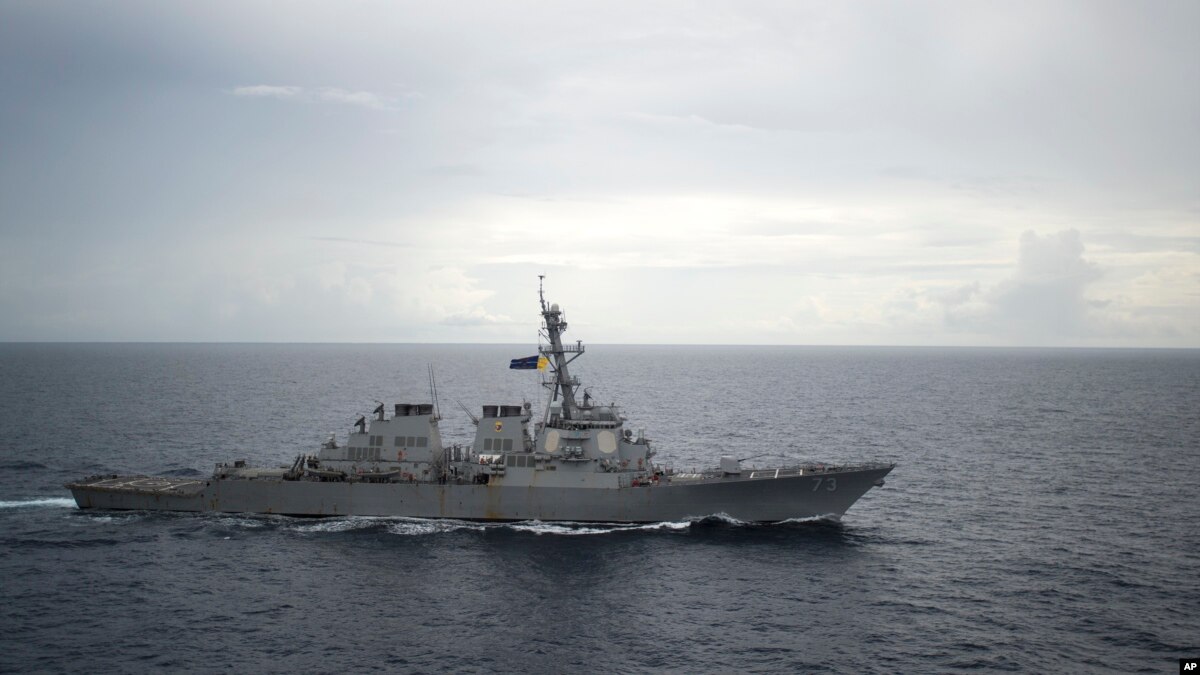
[ad_1]
A near collision between Chinese and U.S. ships in the contested South China Sea has shaken Asian countries whose economies and military security depend on a tense yet nonviolent Sino-U.S. relationship, and has raised the stakes for a deal with Beijing.
The USS Decatur came within 40 meters of a Chinese ship in the South China Sea’s Spratly Islands September 30, causing the American vessel to change course, media reports say. China claims 90 percent of the sea that’s off its south coast, but the United States says other countries have legal rights to use it.
On Saturday, defense leaders from the 10-member bloc Association of Southeast Asian Nations (ASEAN), four of which dispute China’s claims, used a summit in Singapore to seek explanations from Chinese and American participants including U.S. Defense Secretary James Mattis.
Those countries worry that a real collision someday may accelerate Beijing’s militarization of the sea to ward off Washington, scholars say. Countries such as Malaysia and Vietnam value the existing friction to get money from China, which wants them on its side, in addition to military protection against China from the United States.
“The question is whether one side deliberately tries to take provocative moves to make a certain statement and runs into the risk of miscalculation,” said Yun Sun, East Asia Program senior associate at the Stimson Center think tank in Washington.
“The near-collision makes ASEAN more wary and anxious,” Sun said. “They want the U.S. to be more engaged in the region, but are not willing to see the risk of conflict or war with China in the South China Sea.”
Near miss
The U.S. destroyer was making one of what Washington calls “freedom of navigation operation” moves in the South China Sea. The United States does not claim the 3.5 million-square-mile waterway but wants it open internationally and says the Chinese warship made an unsafe move.
China’s official Xinhua News Agency accused the United States in an editorial Friday of entering a sea too far from its coasts. “Which party was aggressively closing in upon the other?” Xinhua said. “The answer is self-evident.”
China has upset the United States as well as Southeast Asian leaders by landfilling the sea’s tiny tropical islets for military installations. It has sent bombers and missiles to some of those holdings.
Brunei, Malaysia, the Philippines, Taiwan and Vietnam contest the Chinese claims. They value the sea for fisheries, fuel reserves and marine shipping lanes but lack the military or economic clout to vie with China’s expansion.
After the ASEAN Defense Ministers’ Meeting, Singapore’s minister, Ng Eng Hen, called the incident “too close for our comfort,” the Singapore-based Straits Times reported.
Call for formal restraints
Southeast Asian nations are wary of Beijing’s naval expansion but look to China’s $12 trillion-plus economy for investment, trade and tourism. To check China’s expansion, many have turned to the United States for weaponry and quietly welcome the “freedom of navigation operations”, or FONOPs.
“I don’t think ASEAN will resist these types of overt signaling behaviors using FONOP,” said Stuart Orr, business and law professor at Deakin University in Australia. “For example, the Philippines is becoming increasingly uncomfortable about China’s development of the reefs right near its coastline, Malaysia has cooled in its relationship with Beijing and Vietnam of course is experiencing increasing conflict with China.”
The U.S. Navy sent vessels through the Taiwan Strait this week in what experts call a show support for a welcoming Taiwan, an informal U.S. ally, over China. China claims self-ruled Taiwan as part of its own territory.
China-ASEAN union
The near collision gives China a chance to improve relations in Southeast Asia by signing a code of conduct aimed at heading off such mishaps. China, after years of stalling, agreed last year to open talks with ASEAN on that code. The United States is not a party to it.
China will use the code of conduct to bolster its foreign relations, “to say ‘we can manage South China Sea disputes on our own,’ said Collin Koh, maritime security research fellow at Nanyang Technological University in Singapore. Southeast Asian maritime claimants would applaud.
“I think what they want to do is try to pull every concerned party into those mechanisms and at least provide some predictability, and of course the end result is sort of promote some stability,” Koh said.
The United States will safely pass ships into the disputed sea, said Sean King, vice president of the Park Strategies political consultancy in New York.
“I see very low risk of any U.S.-PRC mishap at sea, as just too much is at stake,” King said. “Both sides are too careful. I don’t think it’ll happen.”
Source link